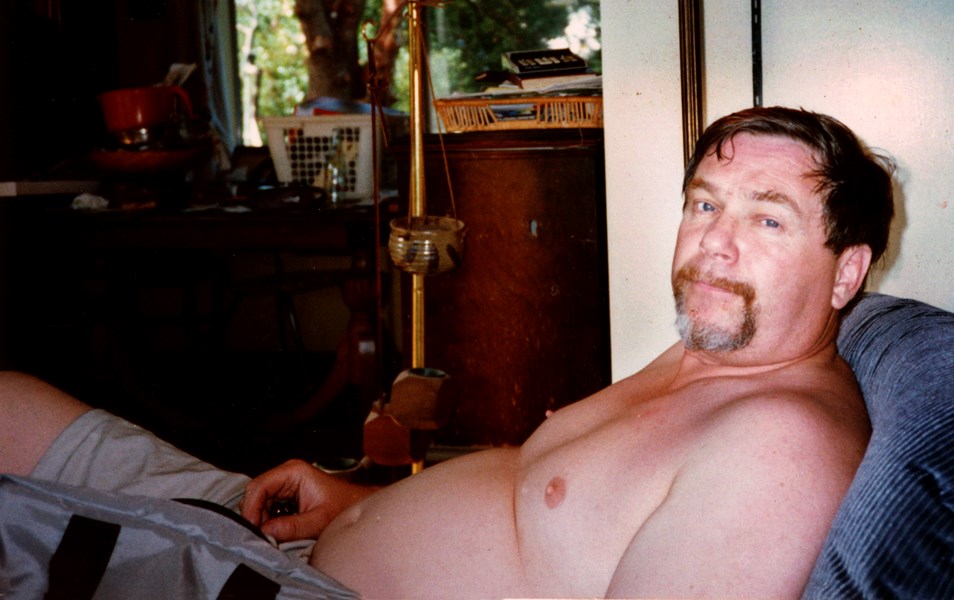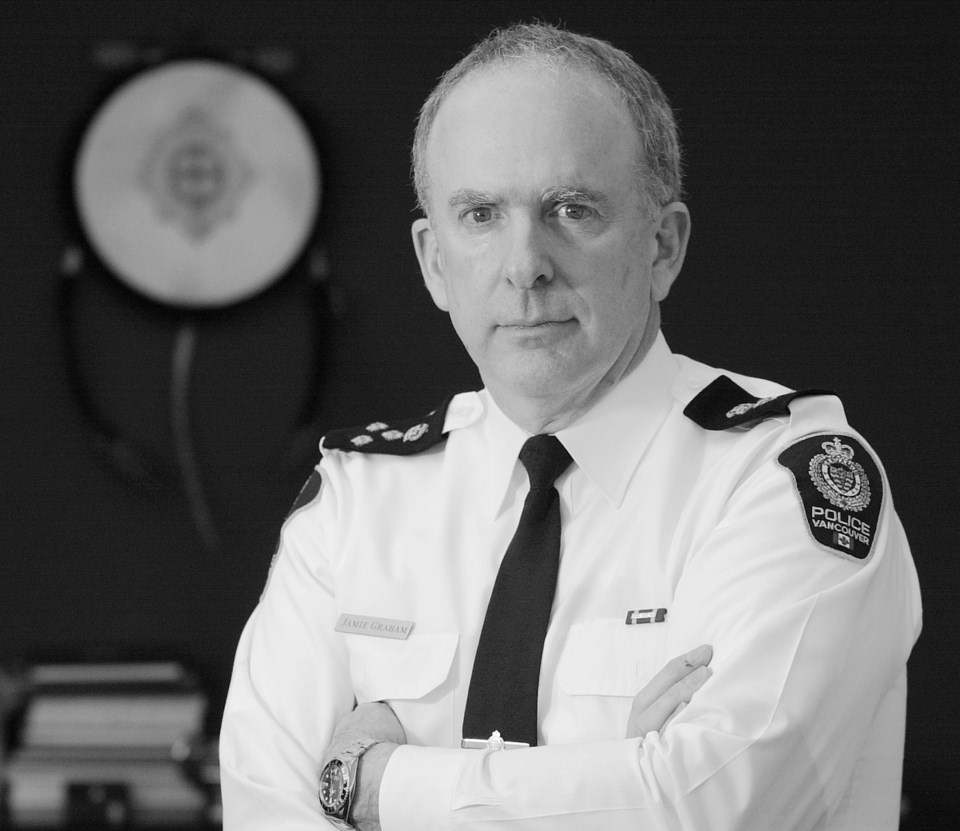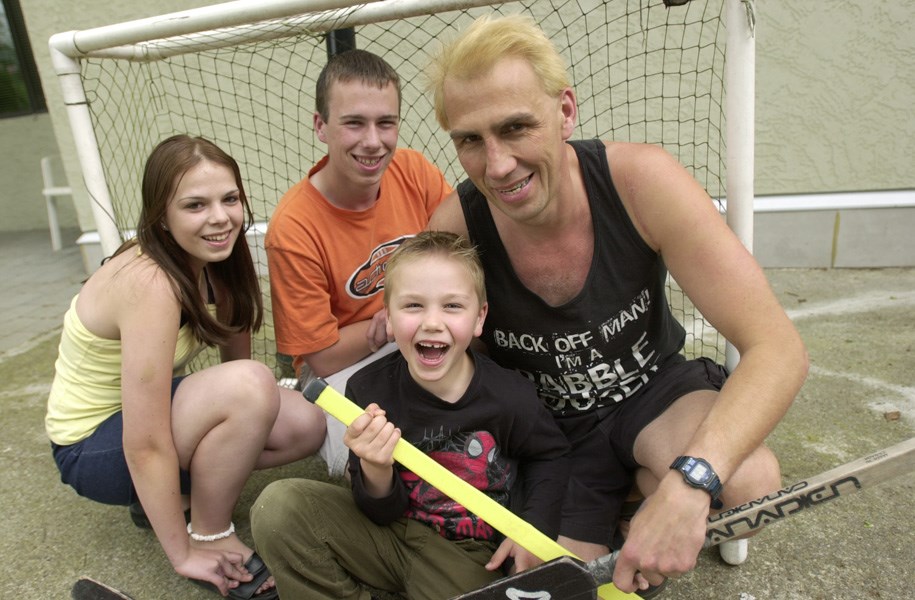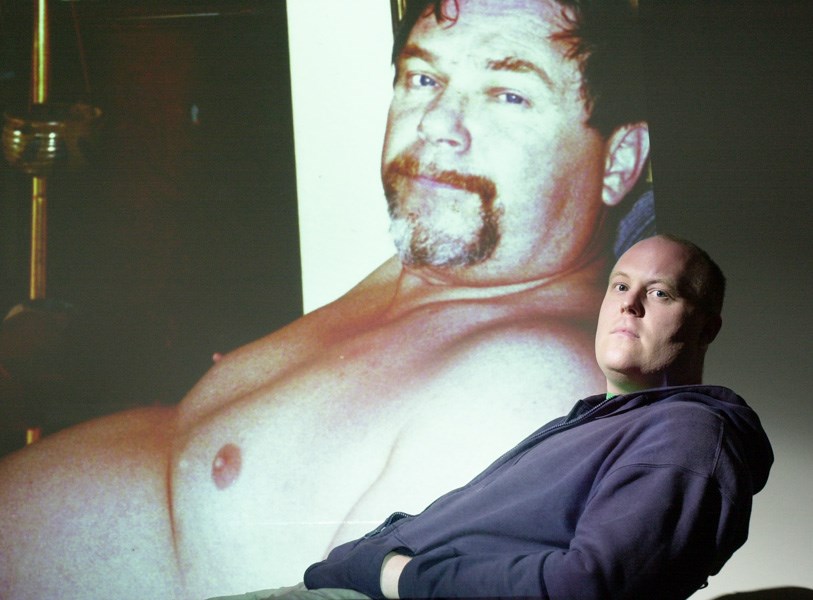In honour of Father’s Day, the Courier is reposting a feature story that I wrote about my dad in 2003.
When it came out, the reaction was mixed. One of my sister’s roommates told her that I obviously had a lot of unresolved father issues, while one of her more “free spirited” friends thought I was extremely brave for talking so openly about my apparent childhood eating disorder. And pretty much every female at the Courier thought it was insensitive of me to refer to my sister’s large calves in print. I just thought I had written a humourous story about my quirky dad and was stoked we ran a photo of him shirtless on the cover of the newspaper. I later printed the front page, framed it and gave it to him for his birthday the following year. I think he keeps it in his fly-tying room.
Besides the fact I was 31 in 2003, the other thing that startled me after revisiting the piece was how much I was allowed to use the word “ass” in this story — something my editor definitely would not allow today. Since this story was first published, my father no longer lives in a pink house with his second wife, Larry Campbell is now a senator, Jamie Graham became head of the police force in Victoria and retired a few years ago, Joey Keithley continues to resurrect DOA while running (so far unsuccessfully) for political office, my brother has returned from Sweden and lives in Cobble Hill with his wife and two children and I realize that my sister's calves are perfectly normal (you could even say toned).
—MK
Originally published June 15, 2003
When I was in Grade 6, I went on an all-cheese diet. A piece of cheese for breakfast, a piece of cheese for lunch and whatever I was forced to eat for supper.
Why I chose cheese and not barbecue-flavoured peanuts or some other readily available dairy product remains one of the great mysteries of my 31-year-old life. What I do remember, though, is how determined I was not to inherit my father's body type — an overweight, broad-shouldered cross-pollination of Raymond Burr, Tony Parsons and then-B.C. Lions offensive lineman Al Wilson.
Years of being nicknamed Mount St. Helens by geographically astute classmates and the fact my mother had decided she could no longer live with my hulk of a father had led me down the milk-soaked path to slenderness. Within a year, I lost 50 pounds, grew half a foot taller and looked nothing like the man I was supposedly destined to become.
However, in the 20 years that have since passed, all my efforts have proven futile.
Not only have I gained back more than a few Costco-sized blocks of cheddar, but according to my two siblings, I've started to take on the very features, mannerisms and personality ticks that have made our dad the object of our well-meaning mockery since I can remember. The grumpiness, poor table manners, large calves, a tendency to stare blankly into the distance during lengthy conversations and, horror of horrors, plumber's ass.
It seems my father's two-to-three-inch blindingly white slice of butt crack, which was practically a neighbourhood fixture when I was growing up on account of his propensity for gardening, working on his car and walking around the house shirtless, has somehow crept its way onto my equally pale backside. And no amount of belts or untucked shirts can do anything about it. I guess we all have our crosses to bear.
There is arguably no more profound — some would say terrifying — experience than the moment you first realize you have somehow, without warning, without provocation, become your parent. It serves as a not-so-subtle reminder of the inherent limitations of self-determinism and the fact that there will always be forces well beyond your control and ability to subsist for short periods of time on nothing but dairy products.
Shirtless in Nanaimo
By all accounts, my dad was a good father while I was growing up. A probation officer who would drink 16 cups of coffee a day — including one before he went to bed so he could sleep —he had an odd habit of frying venison with his shirt off, which would inevitably lead to hot grease spattering his unusually large nipples, causing him to swear profusely, and in turn, get mad at us for some benign household chore we forgot to do that day.

But when he and my mom separated, I truly believe he found his calling as a single parent. Suddenly, all of his rough edges and questionable fashion sense — like wearing gumboots with cut-off shorts made from polyester dress slacks — became charming in the eyes of the soccer moms he'd ply with spiked coffee from his industrial-sized thermos. A practice he abruptly stopped one day after he shared his coffee with one of the dads and neglected to inform him about the flavouring. As it turned out, the man was a recovering alcoholic who hadn't touched alcohol in nine years.
To this day, if any of us mentions this traumatic event, or any other social faux pas, my father's reply is simple: "If you can't embarrass your kids, what's the point of having them?"
I have other memories of my father and the advice he's selflessly bestowed upon us over the years. It includes, in no particular order:
"When sprinting, run on your tippy toes for optimal speed."
"You can kill a moose that has its back turned towards you by shooting it through the ass."
"The secret to any good meal? A little bit of white pepper."
"You don't need deodorant if you shower regularly."
"A bear without fur looks like a human being."
"A penis doesn't have a conscience."
"You think going to Pharmasave to buy condoms is embarrassing? Think of how embarrassed you'll feel if you have to tell Mr. so-and-so he's going to be a grandfather."
"A little dirt never killed anyone."
This is my father's legacy. Questionable hunting, running and personal hygiene techniques, an abundantly clear understanding of the importance of safe sex and an appreciation for a spice I probably will never use.
Every dad gets his day
Fathers are strange beasts, full of contradictions and, according to some, in a precarious state of transition.
While society has made inroads with increased gender equality in the workplace, parity in the household has been slow to catch up. Ask anyone about their relationship with their parents, and most will say they have a stronger emotional bond with their mother.
Look at how we celebrate Mother's Day and Father's Day.
An article in the National Post last month pointed out that although many of us express egalitarian ideas on gender roles in marriage, we revert to tradition when it comes to the two celebrations.
For example, Mother's Day tends to emphasize the nurturing female — gifts are typically flowers, taking mothers out to dinner and relieving them of household chores for the day.
On the other hand, Father's Day gifts tend to be related to employment or athletic pursuits. I would go so far as to argue that the cultural artifact known as "soap on a rope" wouldn't exist if it weren't for Father's Day.
Father's Day even began as an afterthought to Mother's Day. Lore has it that Sonora Dodd of Spokane, Wash. first had the idea for Father's Day in 1909 while listening to a Mother's Day sermon.
The way fatherhood gets depicted in popular culture is also telling. While there are remnants of the Father Knows Best and the Ward Cleever era of parenting, fathers are increasingly portrayed as bumbling man-children providing comic relief. Think Homer Simpson, Three Men and a Baby, Eddie Murphy's slapstick father figure image in Daddy Daycare or Ozzy Osbourne, the poster boy for feeble-minded, doddering dads.
Barbara Mitchell, an associate professor in sociology at Simon Fraser University, points to changes in family structure over the past 50 years to explain why our view of fatherhood has changed so much.
"Historically, we've seen much more patriarchal, hierarchical family structures with Dad as the head of the household and it's do as he says," says Mitchell. "Probably it instilled a certain amount of fear in children given that role that fathers took on. But with a lot of changes we've experienced — demographic changes, people are living longer, we're having fewer children —we've seen more of a shift between all family relationships becoming less hierarchical. And I think as a result of that, fathers have been able to have less authoritative relationships with their children."
Mitchell suspects this shift explains why fathers are frequently depicted in a comic light in popular culture.
"It's almost like they've become reduced to children. They're big babies and they're bumbling around and not taken as seriously. So maybe it's sort of an extreme manifestation of the shifts that have occurred in fathers' roles within the family. And the media of course, likes to make us laugh."
Pop of the cops
Seeking further insight into what makes fathers tick, I called upon a few of this city's most prominent father figures — namely the mayor, the chief of police and one of the fathers of punk rock in Vancouver.
While the mayor, like many overworked father figures, was too busy talk, Chief Constable Jamie Graham and D.O.A.'s Joe "Shithead" Keithley were more than happy to weigh in on the topic of fathers — their own and the enigmatic institution as a whole.
A career military officer, Jamie Graham's father was typical of the '50s, says Graham: not very expressive and a firm believer in the importance of order and traditions. He was a history buff, a fly fisherman and an avid reader. He hated to be away from home and never swore. He was also the last lay magistrate in Ontario (a judge without legal training appointed by the government) and a man who collected bird recordings from National Geographic.
"I freely admit that I learned more from my mother," says Graham, "but [my father] taught me a couple things that I'm especially proud of. One of them is the importance of an oath... If you say something and you give your word and you give your assurance, it doesn't matter how much pain or how much time or what it costs you, you do it."

Graham, a self-described "triple A personality" who's a big believer in structure and focus and likes to keep everything on his desk at right angles, also credits his father with bringing much-needed stability to their itinerant lives. Until Graham was 13, he never lived in one place for more than two years.
"He recognized that when we were 12 or 13, things weren't going well for my brother and me. I make no bones that I wasn't a good kid, and he shipped my brother and I off to what at the time was considered a fairly rigid boarding school. So many of the role models I developed were my headmaster, some of the teachers I had. And from there I went into RCMP boot camp in 1968. And that was easy for me after boarding school."
Graham says his father, who died in 1988, was scared of his own father, and never wanted that to be the case with his children. He taught his sons the importance of diplomacy, and although he wasn't a huge presence during Graham's adolescence, the relationship helped Graham become the man he is today.
"My wife and I both grew up with fathers who didn't come to all your baseball games. They didn't praise you all the time. But in a way, it forced you to suck it up and get on with your life. And when you look back now, I turned out OK."
Punk rock dad
Although Joe Keithley readily admits he rarely saw eye-to-eye with his "hard ass" father while growing up on Burnaby Mountain, his dad played an integral role in shaping his son's vocation as a politically minded punk rocker in D.O.A. and the founder of Sudden Death Records.
"My father made me really political because he was really right-wing," says Keithley. "So me and my brother, who is one of the organizers for the Canadian Auto Workers, turned out completely opposite, almost on the radical side. Not by his intentions. That's not what he wanted... As a parent he had good qualities but he definitely had a streak of Archie Bunkerism."
He also credits his father, who turns 90 this summer, with instilling in him a fierce work ethic. Weekends were usually filled with chores like pouring concrete, minding the lawn and garden, and building rock walls.
According to Keithley, it wasn't until he turned 30 and started having kids of his own that he began to recognize aspects of his father in himself.
"There's that old saying that apples don't fall far from the tree," says Keithley. "You recognize similarities, but as with anything in life, if you don't continue to learn or try to improve yourself, then there's nowhere to go but downhill. So I take some examples from my father, both the good and the bad points, and try to learn from those."
As for his own parenting techniques, Keithley says he's considerably less volatile than his father, who he would argue with constantly as a teenager.
"Once you get to a certain age, 14, 15, 16, 17, somewhere around there, your parents really can't tell you what to do anymore. So what you've got to do when your kids are growing up... is to try and instill in them a sense of what's right and wrong, which is probably one of the big things our society is lacking at times."

So what does his own family think of his punk rock pedigree? Keithley says his three kids are somewhat impressed. "They like it. I mean I'm not their favourite artist. I think my daughter said, 'I'd like your band if you weren't my dad.'"
This Father's Day, Keithley says his clan will probably go to a park if it's sunny, but apart from that, he doesn't consider the event a big deal.
"I mean, what do you do? You get stuff like lawn trimmers... Not all the time, but the vast majority, it's the woman who really holds it together for the kids, so I think Father's Day should be a little lower on the scale."
Sibling ribaldry
In search of some much-needed female perspective, I asked my younger sister for insight into the business of fathers and families. As the youngest child, she clearly reaped the benefits of her older brothers' pioneering efforts. Not only did she have a later curfew than we ever had, she was allowed to eat cereal with sugar in the first two ingredients. She also got to paint the downstairs bathroom black and have friends smoke in her bedroom.
Still a little resentful, I remind her that she's inherited our father's calves. There's a long and uncomfortable silence before she begins pointing out the many similarities she's noticed between our father and me — the way I grip the arms of chairs, my grumpiness... my plumber's ass. Apparently my table manners leave something to be desired as well.
"The thing about Dad," she later says, "was that he was at every single soccer game of ours, running lines in his gumboots and cut-off shorts. He was at every single parent-teacher thing wearing hideous stuff, but at least he was there."
After my heart-to-heart with my calfy sister, I call up my younger brother in Sweden, where he works as a wildlife officer.
"I found myself frying up some reindeer the other day, and my shirt was off and I remember thinking, 'Oh my god, I'm Dad,'" my brother tells me, adding, "I think my nipples are getting as large as his as well."
I feel your pain, bro, I want to tell him. But like our Dad, I have problems expressing my emotions.
"You know, I think we make fun of him so much because we're really just laughing at ourselves," he says. "And we're trying to make ourselves feel OK about who we're becoming."
Father sort of knows best
From Oedipus to Luke Skywalker, there is perhaps no more defining moment in a son's life than when he's forced to face his father. I decide to take the plunge.
My father is now re-married, lives in a pink house with its very own "cupid room," hunts for antique china instead of animals, and has lost close to 85 pounds, making us nearly the same weight. He describes his own father, an electrician, as the classic male of his generation. "He was a typical breadwinner. A very reliable individual, somewhat distant, and probably didn't know what he wanted for himself. He tended to hide too much in his church... his word was law and that kind of stuff, but everyone knew the real power was with the mother anyway."
My father says he inherited a strong sense of right and wrong from his dad, but remembers only one nugget of advice while growing up. "Come summertime, he used to lecture us on guarding our eyes when we went to the beach because all the skimpy bathing suits 'might lead to occasions of sin.'"
"Did your father have plumber's ass?" I ask.
"What's that?"
"It's when your pants hang so low that it shows the top of your ass. You of all people should know what that is."
"No, my father would never have had that. He wore suspenders. And for your information, I wear them as well now."
My dad says he started seeing his father in himself about 15 years ago when he found himself falling asleep in front of the TV after dinner, just like his dad used to do.
"I always said that I was going to do everything totally different. Every generation does that. But you sometimes catch yourself and realize that you're not as radically different from your parents as you once thought."
There it was. The cold, hard, nipply truth. I guess sometimes it just takes an older, shirtless, wiser person to put it into perspective.
VIDEO: Fishing with my dad (a.k.a. "Basher Bob")
Eve River from Michael Kissinger on Vimeo.



